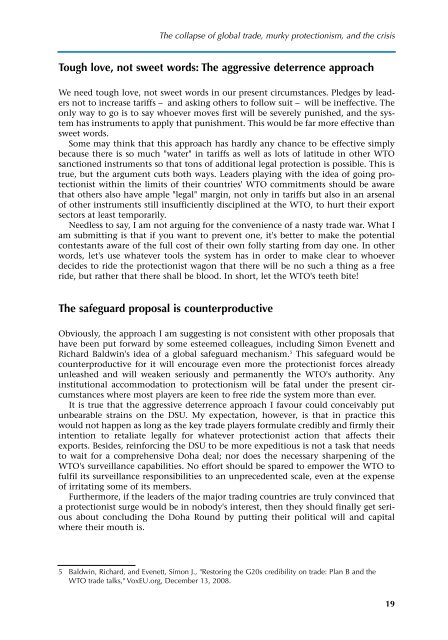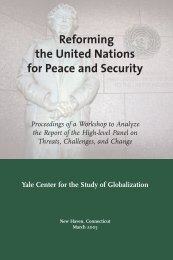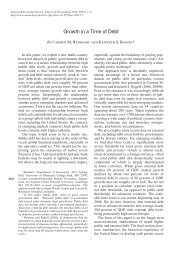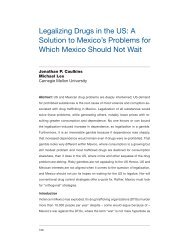The collapse of global trade, murky protectionism, and the crisis:
The collapse of global trade, murky protectionism, and the crisis:
The collapse of global trade, murky protectionism, and the crisis:
You also want an ePaper? Increase the reach of your titles
YUMPU automatically turns print PDFs into web optimized ePapers that Google loves.
<strong>The</strong> <strong>collapse</strong> <strong>of</strong> <strong>global</strong> <strong>trade</strong>, <strong>murky</strong> <strong>protectionism</strong>, <strong>and</strong> <strong>the</strong> <strong>crisis</strong><br />
Tough love, not sweet words: <strong>The</strong> aggressive deterrence approach<br />
We need tough love, not sweet words in our present circumstances. Pledges by leaders<br />
not to increase tariffs – <strong>and</strong> asking o<strong>the</strong>rs to follow suit – will be ineffective. <strong>The</strong><br />
only way to go is to say whoever moves first will be severely punished, <strong>and</strong> <strong>the</strong> system<br />
has instruments to apply that punishment. This would be far more effective than<br />
sweet words.<br />
Some may think that this approach has hardly any chance to be effective simply<br />
because <strong>the</strong>re is so much "water" in tariffs as well as lots <strong>of</strong> latitude in o<strong>the</strong>r WTO<br />
sanctioned instruments so that tons <strong>of</strong> additional legal protection is possible. This is<br />
true, but <strong>the</strong> argument cuts both ways. Leaders playing with <strong>the</strong> idea <strong>of</strong> going protectionist<br />
within <strong>the</strong> limits <strong>of</strong> <strong>the</strong>ir countries' WTO commitments should be aware<br />
that o<strong>the</strong>rs also have ample "legal" margin, not only in tariffs but also in an arsenal<br />
<strong>of</strong> o<strong>the</strong>r instruments still insufficiently disciplined at <strong>the</strong> WTO, to hurt <strong>the</strong>ir export<br />
sectors at least temporarily.<br />
Needless to say, I am not arguing for <strong>the</strong> convenience <strong>of</strong> a nasty <strong>trade</strong> war. What I<br />
am submitting is that if you want to prevent one, it's better to make <strong>the</strong> potential<br />
contestants aware <strong>of</strong> <strong>the</strong> full cost <strong>of</strong> <strong>the</strong>ir own folly starting from day one. In o<strong>the</strong>r<br />
words, let's use whatever tools <strong>the</strong> system has in order to make clear to whoever<br />
decides to ride <strong>the</strong> protectionist wagon that <strong>the</strong>re will be no such a thing as a free<br />
ride, but ra<strong>the</strong>r that <strong>the</strong>re shall be blood. In short, let <strong>the</strong> WTO's teeth bite!<br />
<strong>The</strong> safeguard proposal is counterproductive<br />
Obviously, <strong>the</strong> approach I am suggesting is not consistent with o<strong>the</strong>r proposals that<br />
have been put forward by some esteemed colleagues, including Simon Evenett <strong>and</strong><br />
Richard Baldwin's idea <strong>of</strong> a <strong>global</strong> safeguard mechanism. 5 This safeguard would be<br />
counterproductive for it will encourage even more <strong>the</strong> protectionist forces already<br />
unleashed <strong>and</strong> will weaken seriously <strong>and</strong> permanently <strong>the</strong> WTO's authority. Any<br />
institutional accommodation to <strong>protectionism</strong> will be fatal under <strong>the</strong> present circumstances<br />
where most players are keen to free ride <strong>the</strong> system more than ever.<br />
It is true that <strong>the</strong> aggressive deterrence approach I favour could conceivably put<br />
unbearable strains on <strong>the</strong> DSU. My expectation, however, is that in practice this<br />
would not happen as long as <strong>the</strong> key <strong>trade</strong> players formulate credibly <strong>and</strong> firmly <strong>the</strong>ir<br />
intention to retaliate legally for whatever protectionist action that affects <strong>the</strong>ir<br />
exports. Besides, reinforcing <strong>the</strong> DSU to be more expeditious is not a task that needs<br />
to wait for a comprehensive Doha deal; nor does <strong>the</strong> necessary sharpening <strong>of</strong> <strong>the</strong><br />
WTO's surveillance capabilities. No effort should be spared to empower <strong>the</strong> WTO to<br />
fulfil its surveillance responsibilities to an unprecedented scale, even at <strong>the</strong> expense<br />
<strong>of</strong> irritating some <strong>of</strong> its members.<br />
Fur<strong>the</strong>rmore, if <strong>the</strong> leaders <strong>of</strong> <strong>the</strong> major trading countries are truly convinced that<br />
a protectionist surge would be in nobody's interest, <strong>the</strong>n <strong>the</strong>y should finally get serious<br />
about concluding <strong>the</strong> Doha Round by putting <strong>the</strong>ir political will <strong>and</strong> capital<br />
where <strong>the</strong>ir mouth is.<br />
5 Baldwin, Richard, <strong>and</strong> Evenett, Simon J., "Restoring <strong>the</strong> G20s credibility on <strong>trade</strong>: Plan B <strong>and</strong> <strong>the</strong><br />
WTO <strong>trade</strong> talks," VoxEU.org, December 13, 2008.<br />
19





